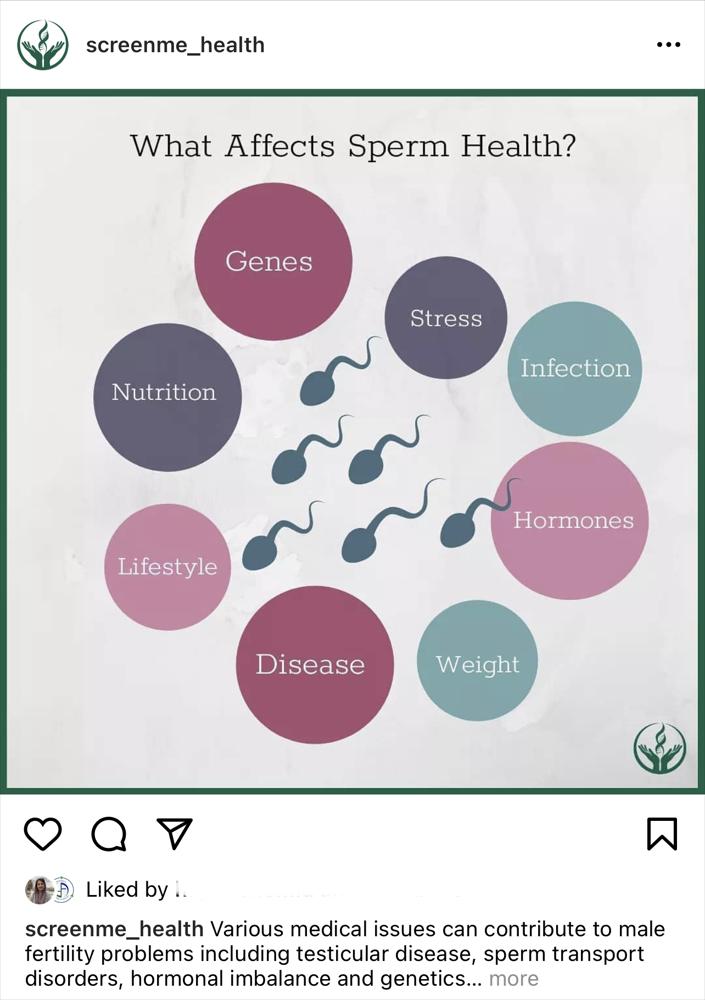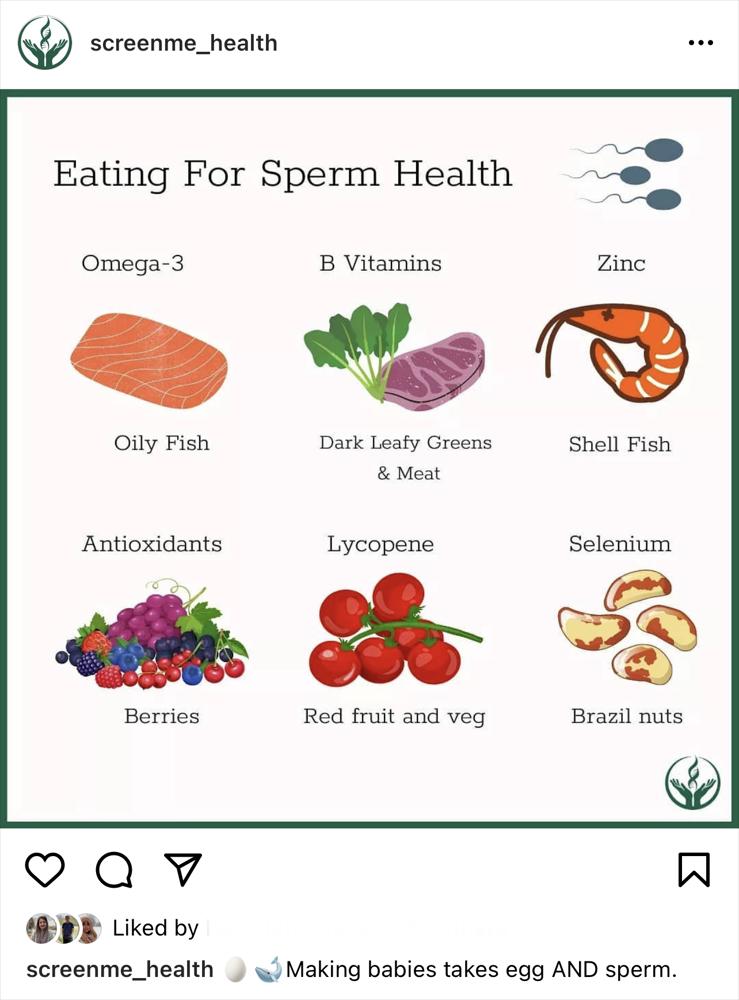Making little humans is Teamwork, Men, board now!

Teamwork makes dreams work, assessing the health of everyone involved in the process of making a little human simultaneously leaves no stone unturned. Whatever your journey to parenthood: natural conception, IUI, IVF, surrogacy, it is vitally important that a man (or sperm donor), look after himself on that journey.
Why Male Fertility Matters?
Female health is often the focus when it comes to fertility struggles, but research has shown that male sperm health affects around 1 in 3 couples who are struggling to get pregnant.
Sperm health or sperm quality can be affected by medical issues and lifestyle choices. Some simple changes may help you to increase your chance to become pregnant.
How to increase male fertility
Here are 9 steps which improve your chance to become a dad.
-
Keep your scrotum in cool temperature.
Sperm in your testicles need to be kept at a slightly cooler temperature than the rest of the body; regular exposure to hot temperatures can have a negative impact on sperm quality and production.

ScreenMe Tips
Avoid heated places like hot pools, Jacuzzis, hot baths/showers, professional kitchens. If you have to be in those places try to take regular breaks.
- Don’t put mobile phones in your front pocket or laptops on your lap
- Wear a comfortable underwear. There’s a reason why Calvin Klein design loose boxer shorts and celebrities wear them! If your nether regions are warming up without reason, consider getting up and cooling them down.
medicines and recreational drugs can decrease male fertility.
Recreational drugs such as cannabis, cocaine or anabolic steroids are known to reduce sperm quality and are best avoided. Prescription medications can impact sperm health, this includes antibiotics, pain killers, anti-depressants and treatments that suppress your immune system.
ScreenMe Tip:
Review your medications with your GP and discuss the impacts on your fertility openly.
-
Dormant or active infections and sexually transmitted diseases cause male infertility.
STIs can be problematic for sperm, Chlamydia and Gonorrhoea being the 2 most common that are easily treated with antibiotics. If left untreated, they may lead to problems in the tubes that carry sperm rendering them unable to reach their target and causing reduced fertility. To figure out more what else can impact your sperm health check out this post.
ScreenMe Tip:
Though some show no symptoms at all, signs include unusual discharge from the penis, itchiness, sores or rash around the genitals. If in doubt, get tested at a genitourinary medicine (GUM) clinic, sexual health clinic or your GP.
Stop smoking.
There’s no doubt that smoking has a major impact in your sperm health are and how well they can swim to their target. Not only that, but if want to ensure your own optimum health, be able to maintain a strong erection and give your future child the best genes, then smoking is a no-no.

To understand how to quit smoking check this link: https://www.nhs.uk/better-health/quit-smoking/
ScreenMe Tip:
Remember, a flower will not grow in infertile soil, so make sure the terrain is ready to receive this little life by reducing and ideally stopping smoking. You gain so much from stopping as both direct or second-hand smoke not only negatively affects your health but may impact that of your child. There’s lots of help available, talk to your GP.
-
Moderate your alcohol consumption or don’t drink for best fertility.
Over consumption of alcohol can affect your sperm quality and sperm quantity. The recommended limit is up to 14 units per week, that’s just a couple of units per day (1 beer or 1 glass of wine). The crux of it is that if you want a real improvement, then alcohol is not your friend.
ScreenMe Tip:
Stopping drinking whilst you are trying to get pregnant.
-
Reduce Stress to balance your hormones
Recent research shows that stress hormones like adrenaline, catecholamines, and cortisol can slow or stop the release of GnRH (gonadotropin releasing hormone) the body’s main hormone that helps release sex hormones such as LH and FSH; compromised GnRH can affect ovulation in women and reduce sperm count in men and even affect libido in both.

ScreenMe Tips:
- Occupational hazard – if your job is proving to be the main source of stress, consider a career change of look for something different, plan.
- Loop your stressors to solutions, not challenges – the cause of stress may be mostly external and not of your own making, but how you react to it is totally in your power to change. Focussing on thinking solutions and less on the issues causing the stress can help you to gain perspective and take you to reduction mode, instead of negative feedback looping retaining your mind on the negative.
- As yourself - what is the worst that can happen and where will that leave you, when you get there, how can you make the most of it.
Stress less, tactics
- Quality sleep
- Move regularly every day.
- Exercise when you can, various forms in balance.
- Meditate, practice mindfulness.
- Be present in the moment, no one knows what the next second will bring.
- Make lists in priority order and focus on ticking off the top things that cause you stress the most.
- Seek professional counselling if needed.
Lifestyle plays an important role in male fertility.
Research is clear, what you eat affects your sperm health.
Changes in diet and exercise can reduce weight and optimise your health. Men who exercise/move regularly are shown to have better sperm quality than inactive men. Be balanced in your approach, keeping your metabolic rate high is best done with regular daily movement, with research showing it to be more beneficial than too much high-intensity exercise, less frequently, which can have the opposite effect.
ScreenMe Tip:
Avoid what others did, Google, general information, instead focus on your specific needs. Have a professional team, such as the one at ScreenMe, which is made up of NHS registered doctors, geneticists and clinical nutritionists, put a personalised plan together for you and your partner.
Make sure you’re not overweight.
BMI, BMR and waist to height ratios - Being overweight can affect your sperm health; check your BMI (Body Mass Index) to see if you’re in the healthy range, anything over 25 is considered overweight and can affect your sperm health. BMI is just a starting point, check your BMR (basal metabolic rate) and your height to waist ratio (measuring from the base of your ribs, above the belly button, not your trouser size!). At ScreenMe we do all this as part of your fertility package.
ScreenMe Tip:
Get a scale that measures your body composition, not just your weight.
Check your BMI here: https://www.nhs.uk/live-well/healthy-weight/bmi-calculator/
Foods to increase male fertility:
Drink and eat up good wholesome nutritious rich food
Your food day should look like this (general not specific following testing)
Eat the dirty dozen organic if possible – Pesticides can be part of the declining fertility in men, their oestrogen mimicking potential can cause testosterone to decrease, leading to a compromise in sperm production.
One green salad per day – will supply your body with the nutrients it needs for optimal health and DNA protection, adding some raw sesame and pumpkin seeds will give you a zinc.
Dark leafy green vegetables –broccoli, kale, swiss chard, collards and spinach are packed with nutrition, if you dislike the taste, put them in a smoothie.
Nuts and seeds – nuts and seeds can be grinded and included in your smoothies, as a trail mix, on top of salads, and to make nut milks at home.
ScreenMe Tip:
Avoid soy foods that are not naturally fermented as they are oestrogen-mimicking.
Drinks
- Water play - drink plenty of water
- Smoothie operator – will give you a big fix of antioxidants, vitamins, fibre, and minerals and is easy to drink and digest form.
- Pressed for the best - vegetable and fruit juices are an easy way to get your daily supply of whole-food nutrients.
ScreenMe Tip:
Exclude any juices that have added sugar or are sugar free (they generally contain artificial sweeteners)
-
Avoid dairy products or at least keep it to a minimum.
Conventional dairy contains hormones (mostly oestrogen) which, as stated above can have a negative impact on testosterone levels. You can replace milk with nutrient and protein-rich nut milks and favour cottage cheese and real Greek or naturally fermented yogurts. When you do choose to opt in for dairy milk go for whole milk as studies have shown that it is associated with lower risk of metabolic syndromes. To figure out what foods in particular improve male fertility, check out this post on our Instagram page.
Start today and take control of your fertility. You can simply order your male fertility package from our website and take the tests from the comfort of your home. We Test your nutrients and hormones including testosterone, LH/FSH and prolactin to help rule out any impacts and help you implement the best lifestyle for your body and fertility.
References:
The association between daily stress and sexual activity
Guy Bodenmann 1, David C Atkins, Marcel Schär, Valérie Poffet
Affiliations expand
PMID: 20545400
DOI: 10.1037/a0019365
Relationship between stress hormones and testosterone with prolonged endurance exercise
W Daly 1, C A Seegers, D A Rubin, J D Dobridge, A C Hackney
Affiliations expand
PMID: 15618989
DOI: 10.1007/s00421-004-1223-1
The relationship between male BMI and waist circumference on semen quality: data from the LIFE study
Michael L Eisenberg 1, Sungduk Kim, Zhen Chen, Rajeshwari Sundaram, Enrique F Schisterman, Germaine M Buck Louis
Affiliations expand
PMID: 24306102
PMCID: PMC3896223
Alcohol and male reproductive health: a cross-sectional study of 8344 healthy men from Europe and the USA
Tina Kold Jensen,1,2,* Shanna Swan,3 Niels Jørgensen,4 Jorma Toppari,5 Bruce Redmon,6 Margus Punab,7 Erma Z. Drobnis,8 Trine Berit Haugen,9 Birute Zilaitiene,10 Amy E. Sparks,11 D. Stewart Irvine,12,13 Christina Wang,14 Pierre Jouannet,15 Charlene Brazil,16 Uwe Paasch,17 Andrea Salzbrunn,18 Niels Erik Skakkebæk,19 and Anna-Maria Andersson4
Male infertility
Randall B Meacham 1, Geoffrey F Joyce, Matthew Wise, Ashay Kparker, Craig Niederberger, Urologic Diseases in America Project
Affiliations expand
PMID: 17509286
DOI: 10.1016/j.juro.2007.01.131
Definition and causes of infertility
Santiago Brugo-Olmedo 1, Claudio Chillik, Susana Kopelman
Affiliations expand
PMID: 12537824
DOI: 10.1016/s1472-6483(10)62187-6
Trends of male factor infertility, an important cause of infertility
Kumar, N., & Singh, A. K. (2015).: A review of literature. Journal of human reproductive sciences, 8(4), 191-6. Retrieved from https://www.ncbi.nlm.nih.gov/pmc/articles/PMC4691969/
Sperm DNA damage has a negative association with live-birth rates after IVF
- Simon, I. Proutski, M. Stevenson, D. Jennings, J. McManus, D. Lutton, S.E.M. Lewis. Reproductive BioMedicine Online, 2012; DOI: 10.1016/j.rbmo.2012.09.019. Retrieved from https://www.rbmojournal.com/article/S1472-6483(12)00590-1/fulltext



